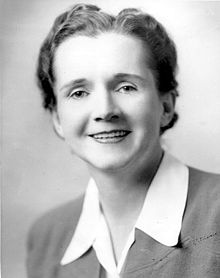Rachel Carson: A Voice for Nature

As March unfolds and Women’s History Month takes center stage, it’s essential to honor the remarkable women who have left an indelible mark on the world. Among these visionary figures stands Rachel Carson—a pioneering environmentalist whose groundbreaking work revolutionized our understanding of the natural world and inspired a global movement for conservation.
Born on May 27, 1907, in Springdale, Pennsylvania, Rachel Carson developed a deep love and appreciation for nature from an early age. She pursued her passion for biology and writing, earning a master’s degree in zoology and embarking on a career as a marine biologist and author.
In 1962, Rachel Carson burst onto the national stage with the publication of her seminal book, “Silent Spring.” In this groundbreaking work, Carson sounded the alarm about the dangers of widespread pesticide use, particularly DDT, and its devastating impact on the environment and human health. Through meticulous research and compelling storytelling, Carson exposed the dangers of chemical pollution and sparked a national conversation about the need for environmental conservation and protection.
Despite the groundbreaking success of “Silent Spring,” Rachel Carson faced considerable opposition and criticism from powerful chemical companies and government officials who sought to discredit her findings and undermine her credibility. Yet, Carson remained steadfast in her commitment to truth and science, her courage and integrity unwavering in the face of adversity.
One of Rachel Carson’s most enduring legacies is her role in catalyzing the modern environmental movement. Her powerful indictment of chemical pollution and advocacy for environmental conservation inspired millions of people to take action to protect the planet. Carson’s work helped to galvanize public support for legislative reforms and policy changes aimed at preserving natural ecosystems and safeguarding human health.
In the wake of “Silent Spring,” Rachel Carson’s advocacy helped to spur significant legislative and regulatory changes. In 1972, Congress passed the Federal Insecticide, Fungicide, and Rodenticide Act (FIFRA), which regulates the use of pesticides and establishes standards for environmental protection. Additionally, the Environmental Protection Agency (EPA) was created in the same year, with a mandate to protect human health and the environment.
As we celebrate Women’s History Month, let us honor the enduring legacy of Rachel Carson—a woman whose courage, compassion, and unwavering commitment to the natural world continue to inspire us all. May her life serve as a reminder of the power of advocacy, the importance of stewardship, and the enduring quest for a more sustainable and harmonious relationship with the planet we call home.
Sign up for Kristy's Newsletter!
Get all the updates on upcoming books and events!
